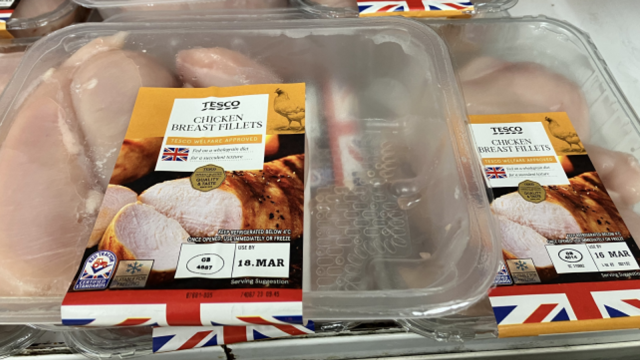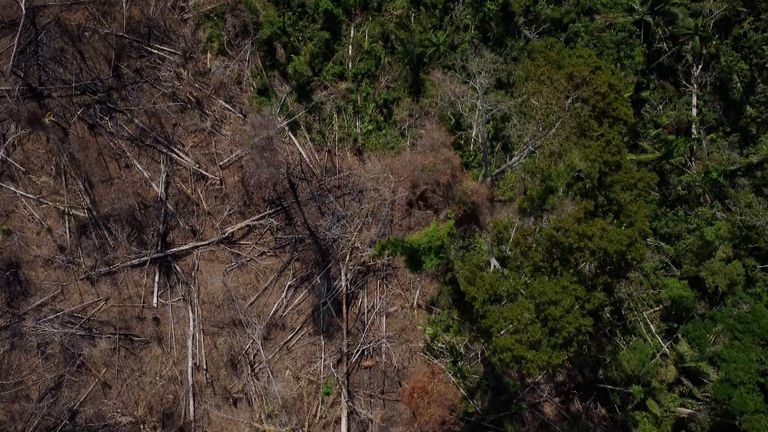The UK meat industry and the supermarkets it supplies are continuing to cause illegal deforestation in the Amazon, according to a new investigation into the supply chain of Brazilian soya beans used to feed British livestock.
Clearing land for cattle and soya beans is a key driver of deforestation in the Amazon.
In 2022 nearly 12,000 square kilometres of the Amazon were destroyed, equivalent to four football fields of forest lost every second.
But joining the dots between the destruction and consumers thousands of miles away is obscured by the complex supply chains that make up our global food industry.
The investigation by environmental groups Mighty Earth, Reporter Brazil and Ecostorm combines satellite data with observations on the ground showing evidence of a direct link between illegal deforestation in the Amazon and supplies of soya beans shipped from Brazil to the UK by US commodities giant Cargill.
“If Cargill, the biggest privately-owned US company, wants to be part of the solution to the climate and nature crisis, it needs to source from suppliers farming on previously degraded land, of which there are 1.6 billion acres in Latin America, alone. Not from those who are still torching forests,” said Glenn Hurowitz, CEO of Mighty Earth.
The report identifies the Santa Ana farm in Brazil’s Mato Grosso state on which 400 hectares of forest were burned last year – an area the researchers estimate would have contained 220,000 trees.
The farm supplies soya to Cargill, which exports the beans via Brazil’s Santarem port to locations around the world, including directly to the UK.
Following an investigation by Brazilian authorities into previous illegal deforestation on the farm, Cargill removed it from the list of its approved suppliers, however it was reinstated by the company in 2022.
Around 70% of the UK’s soya is imported by Cargill and 75% of Cargill’s soya comes into the country from Santarem port in Brazil.
Soya is a key ingredient in animal feed, particularly for intensively farmed chickens and pigs. Once soya is shipped to feed mills, tracing that which may be linked to illegal deforestation becomes almost impossible.
However, one of the UK producers with the greatest exposure to the Brazilian soya is Avara foods – the UK’s largest chicken producer, which is part-owned by Cargill and is directly supplied with feed by them.
Read more:
Amazon being destroyed ‘on an industrial scale’
Brazil moves to pave way through heart of Amazon rainforest
Deforestation in Brazilian Amazon reaches highest level since 2006
Avara produces 4.5 million chickens and turkeys a week in the UK.
Avara supplies many leading supermarkets and suppliers including Tesco, Asda, Lidl, Sainsbury’s, Morrisons, McDonald’s, KFC and Nando’s.
This latest report singles out Tesco as the UK’s largest supermarket chain whose own-brand chicken is supplied by Avara.
“Our investigation shows Tesco is a basket of problems for the Amazon,” said Gemma Hoskins, UK director at Mighty Earth.
“While the UK’s top retailer reaps massive profits, it continues to do business with known forest destroyers such as Cargill, adding fuel to the fire of Amazon deforestation, harming the health of local communities, and decimating wildlife and precious habitats.”
UK food retailers like Tesco are signatories to the UK Soy Manifesto which committed them to ensure their supply chains were “deforestation- and conversion-free” by 2020, with a further commitment to stop sourcing from suppliers linked to deforestation or land conversion by 2025.
In a statement, Tesco told Sky News: “We take any accusation of deforestation and conversion occurring anywhere within our supply chain extremely seriously and we immediately asked Cargill for clarification on the matter and to remove the identified farm from their supply chain until a full investigation can be carried out.”
Chicken producer Avara said that is has sourced soya certified as “deforestation and conversion-free” since 2019.
“Clearly, the challenge is that there are still non-certified farms growing soya in high risk areas and a demand for their produce,” it said in a statement.
It added: “We accept that, for all our progress, there is still work to do if we are to achieve our 2025 goal. We will play our part, working collaboratively with others in the sector and beyond, but we also know that this will not be enough, if others do not also make similar commitments.”
Cargill, which has previously faced criticism for sourcing soya from areas linked to deforestation in the Amazon and other parts of South America, said: “Based on new allegations, in accordance with our grievance process we have initiated an additional investigation of [Santa Ana Farm’s] 2022 operations and if we find any violations of our policies and commitments, the supplier will be immediately blocked from our supply chain, as expressed in our Supplier Code of Conduct.”










![“It’s hard to say goodbye” – Christian Atsu’s wife composes emotional tribute song for him [Video]](https://ghananewss.com/storage/2023/05/Christian-atsu-and-wife-100x75.jpeg)







